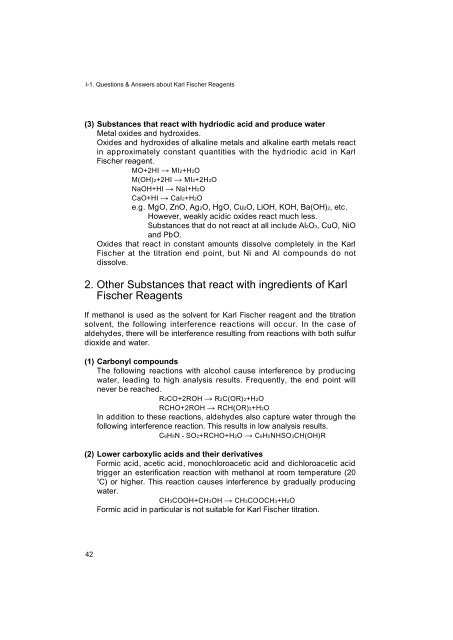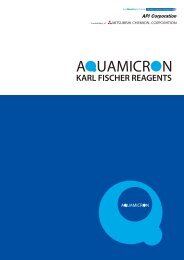Development of Karl Fischer Reagents
Development of Karl Fischer Reagents
Development of Karl Fischer Reagents
You also want an ePaper? Increase the reach of your titles
YUMPU automatically turns print PDFs into web optimized ePapers that Google loves.
I-1. Questions & Answers about <strong>Karl</strong> <strong>Fischer</strong> <strong>Reagents</strong><br />
(3) Substances that react with hydriodic acid and produce water<br />
Metal oxides and hydroxides.<br />
Oxides and hydroxides <strong>of</strong> alkaline metals and alkaline earth metals react<br />
in approximately constant quantities with the hydriodic acid in <strong>Karl</strong><br />
<strong>Fischer</strong> reagent.<br />
MO+2HI � MI2+H2O<br />
M(OH)2+2HI � MI2+2H2O<br />
NaOH+HI � NaI+H2O<br />
CaO+HI � CaI2+H2O<br />
e.g. MgO, ZnO, Ag2O, HgO, Cu2O, LiOH, KOH, Ba(OH)2, etc.<br />
However, weakly acidic oxides react much less.<br />
Substances that do not react at all include Al2O3, CuO, NiO<br />
and PbO.<br />
Oxides that react in constant amounts dissolve completely in the <strong>Karl</strong><br />
<strong>Fischer</strong> at the titration end point, but Ni and Al compounds do not<br />
dissolve.<br />
2. Other Substances that react with ingredients <strong>of</strong> <strong>Karl</strong><br />
<strong>Fischer</strong> <strong>Reagents</strong><br />
If methanol is used as the solvent for <strong>Karl</strong> <strong>Fischer</strong> reagent and the titration<br />
solvent, the following interference reactions will occur. In the case <strong>of</strong><br />
aldehydes, there will be interference resulting from reactions with both sulfur<br />
dioxide and water.<br />
(1) Carbonyl compounds<br />
The following reactions with alcohol cause interference by producing<br />
water, leading to high analysis results. Frequently, the end point will<br />
never be reached.<br />
R2CO+2ROH � R2C(OR)2+H2O<br />
RCHO+2ROH � RCH(OR)2+H2O<br />
In addition to these reactions, aldehydes also capture water through the<br />
following interference reaction. This results in low analysis results.<br />
C6H5N � SO2+RCHO+H2O � C6H5NHSO3CH(OH)R<br />
(2) Lower carboxylic acids and their derivatives<br />
Formic acid, acetic acid, monochloroacetic acid and dichloroacetic acid<br />
trigger an esterification reaction with methanol at room temperature (20<br />
�C) or higher. This reaction causes interference by gradually producing<br />
water.<br />
CH3COOH+CH3OH � CH3COOCH3+H2O<br />
Formic acid in particular is not suitable for <strong>Karl</strong> <strong>Fischer</strong> titration.<br />
42




